Providence Blog
Displaying blogs about Providence. View all blogs
On Paperbacks and Alternate Covers
![]() This time last year, I was all like, “Sure, it sucks to miss out on a book tour, but
I’ll definitely be out there in 2021, once this pandemic blows over.” WRONG. I am still stuck in stupid Australia.
Australia isn’t stupid. I take that back. Australia is terrific. It’s like the rest
of the world but with the volume turned down. There are lots of problems with
people, I’ve decided, that only emerge once you put enough of them in one place. If
they can fill an entire news cycle with stuff that’s bananas, everyone starts feeling like
everyone else is totally bananas all the time, and maybe they should be bananas, too.
This time last year, I was all like, “Sure, it sucks to miss out on a book tour, but
I’ll definitely be out there in 2021, once this pandemic blows over.” WRONG. I am still stuck in stupid Australia.
Australia isn’t stupid. I take that back. Australia is terrific. It’s like the rest
of the world but with the volume turned down. There are lots of problems with
people, I’ve decided, that only emerge once you put enough of them in one place. If
they can fill an entire news cycle with stuff that’s bananas, everyone starts feeling like
everyone else is totally bananas all the time, and maybe they should be bananas, too.
Anyway, my space book, Providence, hits paperback in the US and Canada today. It is actually a very nice-looking paperback. With hardcovers, publishers try to be all coy and unusual, but with paperbacks, they’re more like, HERE’S THE FREAKING BOOK. It’s more subtle this time around because the publisher is trying a bold new thing where they don’t completely throw out the hardcover design, but still, contrast and compare:
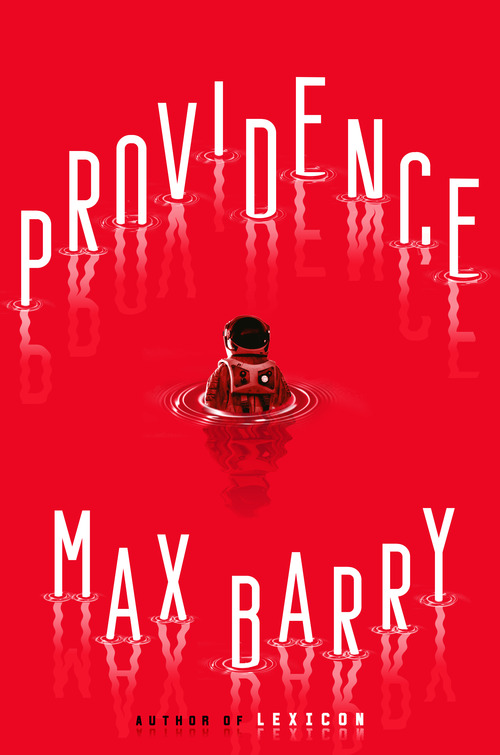 ←Hardcover • Paperback→
←Hardcover • Paperback→

Also, just for fun, here are some covers I mocked up myself from back when the publisher asked, “Do you have any cover ideas of your own?” I always have cover ideas. Not good ones. But I have them. So, since I can’t tell the difference between politeness and a genuine question, I mock things up. Like this:
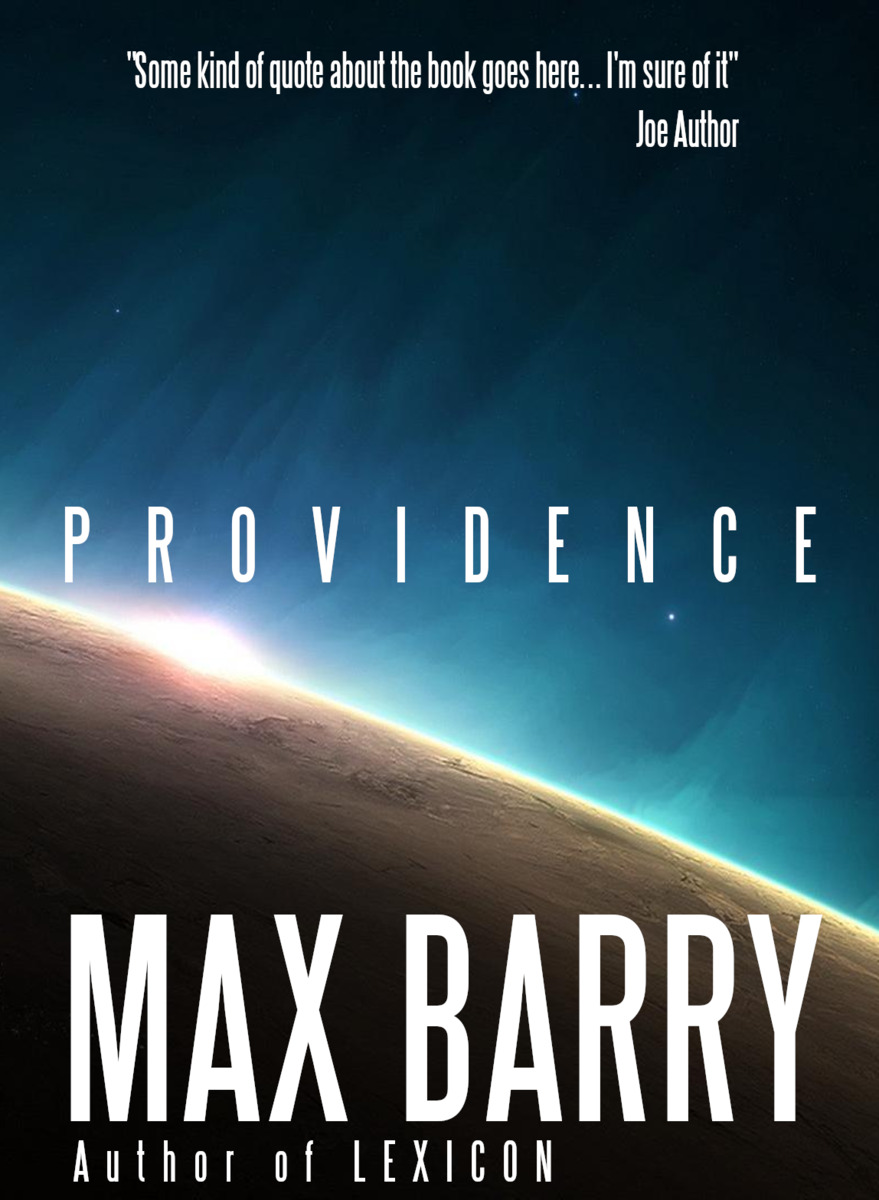
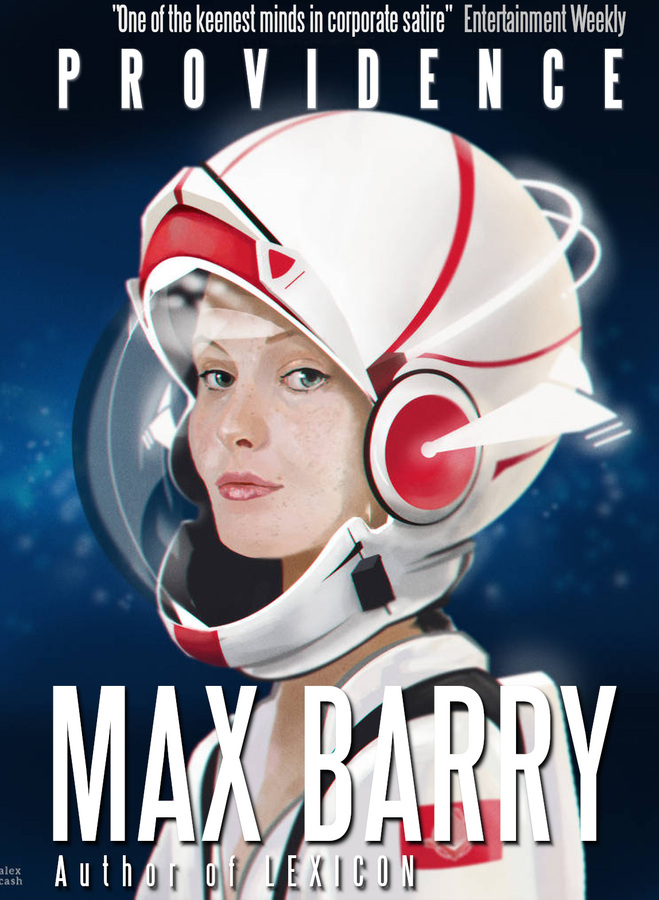
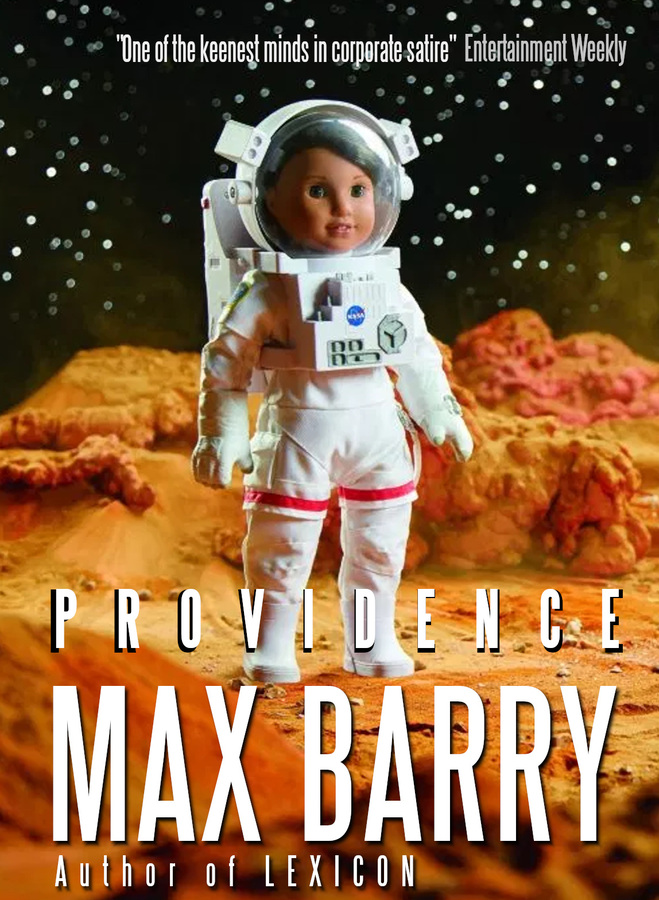
You might notice that all my ideas involve putting my own name in really big type. That’s just coincidence.
Finally, I have seen this but don’t know what it is. Large print edition, I’m guessing. Ironically, the image is tiny and difficult to see clearly.
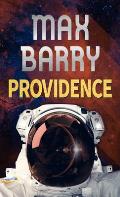
If you don’t have a copy of Providence, and want one in paperback, you can find some buy links here. If you aren’t sure whether you want one in paperback, here is a list of amazing reviews. The Daily Mail says it’s “such a blast you almost overlook how clever it is,” and they’ve never been wrong about anything, so there you go.
Update: I missed one! There is also this German translation, which releases June 14, 2021. The Germans are usually pretty bold with their covers, but in this case they’ve gone for the tried-and-tested “honking big spaceship”. I have to say, I’m not a big fan of those lines that are supposed to show it’s moving really fast. I think we could do without those. But it is a neat-looking ship. The word “roman,” by the way, means “novel,” to make it clear that we aren’t actually sending AI spaceships off to fight aliens in real life.
The Ship With No Name
In PROVIDENCE, did the main ship have a name? If so, I somehow missed it :( Several other Providence-class vessels were named.
StarMan
You’re right! It surely has a name, but we never find out what it is. Everyone calls it “the ship.”
This is one of those oh-so-clever arty author choices, so sorry about that. The idea is to make the ship feel a little more mysterious, more like the fabric of the environment (like “the earth” or “the air”), and also emblematic of the whole collection of AI ships in general. Because, not to get too spoiler-y, there is no real difference between one ship, all the ships, and the corporation that makes the ships. I encourage you to view them all as a single entity.
That goes for the salamanders, too. And maybe the humans! The crew are individuals, but they’re also cogs in the wheel of a military war machine, which grinds toward a particular outcome regardless of the hopes/dreams/desires of each person. So from the perspective of a salamander, or a ship, there may be no practical difference between the people, either.
I’m not a big believer in oh-so-clever arty author devices, because I feel like the worst thing you can do to a reader is remind them they’re reading a book. But if I can slip in something like this without you noticing, I’ll do it.
Thoughts On Whether A.I. Will Kill Us All
![]() Recently I read a 1,600-page book,
“Rationality” by Eliezer Yudkowsky.
That’s a lot of pages.
You wouldn’t be impressed if I read 160 ten-page books. I get through one whopper, though,
that’s worth mentioning.
Recently I read a 1,600-page book,
“Rationality” by Eliezer Yudkowsky.
That’s a lot of pages.
You wouldn’t be impressed if I read 160 ten-page books. I get through one whopper, though,
that’s worth mentioning.
I usually dislike non-fiction, because it feels like cheating. I go to a lot of trouble to craft rich, internally logical dynamic systems of interacting people and parts, and some bozo comes along and just writes down what’s true. I feel like anyone can do that. But this non-fiction book was great, because it changed my most fundamental belief. (Previously, I thought the scientific method of investigation was the best way to figure out what’s true. Now I realize Bayesian inference is better.)
So that’s not bad. If I’m writing a book, any kind of book, and someone reads it and changes their most fundamental belief, I’m calling that job well done. I’m happy if my book changes anyone’s opinion about anything. I just want to have made a difference.
“Rationality” covers a lot of topics, including A.I. Previously, I thought A.I. might be just around the corner, because Google has gotten really good at recogizing pictures of cats. But this book disabused me of the notion that we might be able to push a whole lot of computers into a room and wait for self-awareness to pop out. Instead, it seems like we have to build a super-intelligent A.I. the same way we do everything else, i.e. one painstakingly difficult piece at a time.
Which is good, because I’m pretty sure that A.I. will kill us all. There’s a big debate on the subject, of course, but I hadn’t realized before how much it resembles climate change. By which I mean, in both cases, there’s a potential global catastrophe that we know how to avoid, but the solution requires powerful people and companies to act against their own short-term interests.
This hasn’t worked out so well with climate change. All we’ve managed to do so far is make climate change such a big issue, it’s now in the short-term interest of more of those people and companies to look like they give a crap. I feel like once we get to the point where they have to choose between a financial windfall and risking a runaway super-intelligent A.I., we’re in trouble.
I just listened to a great interview by Ezra Klein with Ted Chiang, who is a brilliant author that you should read, called “Why Sci-Fi Legend Ted Chiang Fears Capitalism, Not A.I.” Ted has a more optimistic view than mine, but I think the premise is exactly right. The danger isn’t that we can’t stop a super-intelligent A.I.; it’s that we’ll choose not to.
How Audio Books Happen
Do you get a say in who reads and voices your audio books? I think the people who narrate them are fantastic! They’re also easy on the ears, as some voices are difficult to focus on what they’re saying, or they make me sleep.
Iolanthe
I do get to choose the narrator, and it’s one of the most exciting things about publishing a book. Especially when there’s a global pandemic that torpedoes my tour.
So how it works is someone from the audio side of the publisher gets in touch to discuss things like how many narrators there should be. I have plenty of opinions, even though I prefer novels in print form and have listened to maybe two audio books in my whole life.
I also write little character notes, e.g.:
Beanfield: F aged 26. A people person, outgoing, strong social skills, but her role is to observe the crew like a psychiatrist, so she’s always faking it a little, holding something of herself back. Has a fanciful internal dialogue. Struggles with the isolation and isn’t keeping it together as well as she thinks she is. Misses home and wishes she hadn’t left.
Then casting happens: Four or five people recommended by the audio director read half a page of the book and I listen and judge them. Not in person. I get emailed files. This is great fun, like casting a movie, although the experience is tempered by how excruciating I find it to listen to my own words being read back to me. Not because of the reader. Because of the words. It is probably no picnic for the performers, either, because the audition text might be short sections ripped from various places throughout the book, so they have to guess at the context.
For my last book, Providence, I went very diva, because although the auditions were good, they weren’t, you know, really hitting it exactly right for me. I don’t know if it’s because I’m Australian or I just have deadpan personal tastes, but sometimes I find American performances to be, how to put this, shall we say, animated. I’m like, if I’d known somebody was going to be emoting the bejeezus out of that sentence, I would have used different words. So anyway, I went and browsed a bunch of random audio books in online stores, listening to samples, and wrote down the names I liked.
Then the audio director had those people read auditions. Which is amazing, right? I’m just pointing at audio books and two days later there are new readings. I mean, I’m sure those people are professionals who produce half a dozen auditions before lunch each day. But still, it’s wild. Little pieces of performance art getting conjured out of nowhere.
Finally, I picked my favourite:
Brittany and Sam were both great. Sam brought a lot of life to the combat scene in particular, and seemed to grasp the tone of that scene best. But I give Brittany the edge because she has a kind of effortless professionalism that is super comfortable to listen to, and suggests a great range.
Sam is not a real person. I changed the name. But Brittany Pressley then narrated the audio book.
And I still haven’t listened to the whole thing, because, you know, the excruciation. But I hear good things. For example, check out this review. The novel is only okay, the reviewer says. Three out of five stars. He is not really a fan. But he kept listening because he liked Brittany’s reading so much. The book was holding Brittany back. It would have been a more enjoyable experience if he’d been listening to Brittany read something different. Maybe literally anything else. Now that’s a good narrator.
New Novel Out Today
![]() So my new book is out! Today! This is the day!
So my new book is out! Today! This is the day!
Providence is about four people on a spaceship who are sent to defend Earth against an alien threat. There are other spaceships, but this is the only one that matters. If they fail, everyone is screwed. But that seems unlikely, because when we learned about the aliens, we plowed everything we had into building these ships, which are immensely powerful, and, to be honest, more than seems necessary to deal with aliens who aren’t even that smart.
I try to write stories that are smart and suspenseful. I’m a big fan of both of those. Especially as I get older, I find I need to believe in a book’s characters: I need them to be making smart choices and asking smart questions. But I also love a story that drags me into it because the simple dynamics of the situation are compelling.
So I hope Providence is this. It has aliens and spaceships in it, which is new for me, and something I’ve wanted to do since… well, since I was about fourteen, probably. Because I really love aliens and spaceships. But it had to be smart and suspenseful and character-driven, too. Hopefully I figured out a way to do that.
If you’re in a place where you could do with a good story, please take a look! If not, I hope you’re doing okay—because I know this isn’t a great time for a lot of people. But we are kind of all in it together. I have to say, of all the terrible crises to be facing, I do like how this one puts all of humanity on the same side. It’s not people against people, for once. We get to face this one as a species.
How To Promote a Book During a Global Pandemic
![]() If you have a book coming out in the next few weeks: Boy, did you get that wrong.
If you have a book coming out in the next few weeks: Boy, did you get that wrong.
Not your fault, obviously; you couldn’t know, as you toiled away, taking your time to carefully craft each word, that your release date would be scheduled for the tipping point of a worldwide crisis. That’s just bad luck. There’s no point fretting about those canceled bookstore and media events now, though, or how New Zealand just shut down every bookstore in the country, even online retailers, and what if other countries do that, I mean, my God. The question is: What do you do?
First, identify which category your book falls into:
- Books about pathogens or pandemics, which are suddenly super relevant.
- Fun escapism books offering to whisk the reader away from terrifying reality for a few hours.
- Books no-one cares about any more.
This is not a great time to be releasing a withering satire of consumerism, for example. No-one wants to hear that right now. We have bigger problems. Take your book and go away until I can stop worrying that I’m going to be coughed to death if I leave my house.
If your book is in the first category, you don’t need to be reading this. Go to your room, close the door, and think about how you might remodel your kitchen once those blood money royalty checks start coming in.
If you’re in the middle category, though, it’s tricky. You want to walk a fine line between coming off like you only care about promoting your novel during a global health crisis—you heartless monster—and not selling any books and having to fall back on your other skills, like pan-handling.
When you do media—if you do media, because, you know, there’s a lot going on, and you’re not the center of the universe—you’ll find they want to talk about something—anything!—other than the virus. Because that’s all they’ve been talking about, all day long, for weeks. But also, if you can relate your book to the virus somehow, to make it seem timely and relevant, they want that, too.
So try to hit secondary themes: topics that are more relatable because of the virus. For example:
- isolation
- being forced into a confined space with other people who you might love very much, but my God, they’re around all the time, you can’t even go to the bathroom without someone asking you a question
- socially distancing, because haven’t we been doing that for a long time, in a sense, when you think about it
- coughing to death
Scrap that last one. Sorry. I just can’t stop thinking about it.
The best kind of promotion now, obviously, is online promotion. And by “best” I mean “only.” The danger here is that in the absence of anything else, you find yourself pounding your existing social media followers with increasingly see-through attempts to thrust your book into their faces. So you’re not spreading awareness far and wide so much as stabbing the same two hundred people in the eyeballs over and over.
If you can, offer something of interest to a wider circle. Like, if you can drop everything and work 16-hour days for two weeks to build an online game based on your novel, then your followers might enjoy that and pass it along to others. The game, that is. Not the virus. Then awareness of your novel can spread from person to person, exponentially, in a similar manner to how we’re all going to die.
Whatever you do, though, I think it would be wise to avoid being overly flippant. Sure, in these grim times, we could all use a little levity. But if it turns out that we’re standing on the precipice of a chasm filled with bodies, I don’t think you want to be the person having a good old chuckle about it. Don’t go too far the other way: Don’t start yanking on the plague bell. You won’t be shifting any copies of your book doing that. Save your existential dread for after pub date.
Aside from that… I’m really not sure. I mean, I wish you all the best. I really do.
Max Barry is the author of Providence, a sci-fi thriller to be released on March 31, 2020.















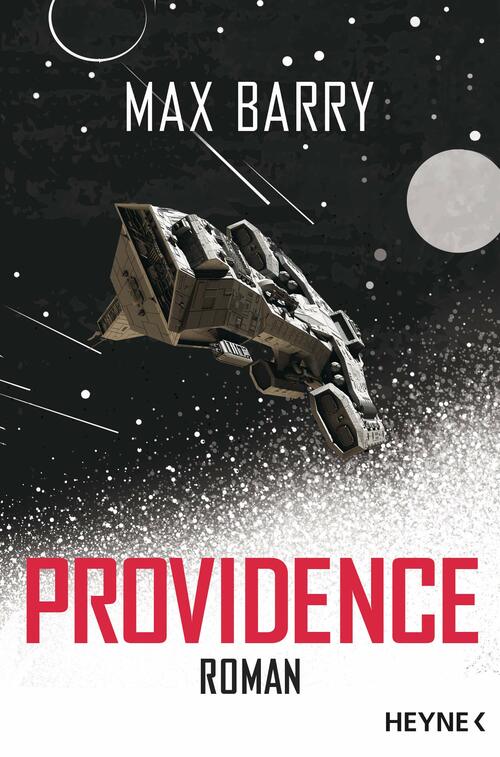
 8 comments
8 comments